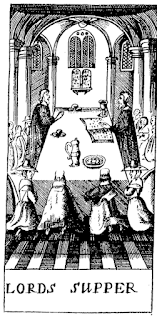'All English divines thus regarded and thus spoke of Calvin': Laudians and Calvinists together
in the mystery of the Supper, under the symbols of bread and wine, Christ is truly presented to us, and so His Body and Blood, in which He fulfilled all obedience to procure our justification; in order that we may first coalesce with Him into one body, and then, being thus partakers of His substance, may experience the virtue also which belongs to Him in the participation of all blessings (IV.17.11).
He then goes on to invoke Laud against Pusey, emphasising that Laud stood firmly within the Reformed eucharistic consensus of the English Church, from Reformation to Restoration:
And most certainly Dr. Pusey did not learn this manner of speaking of Calvin from the great divines of our Church. Take Laud, for example. In the extracts which I have given from him, we see him appealing to Calvin as supporting his mode of expressing himself on the Eucharist, and decidedly asserting that Calvin himself, and the Calvinists, maintained a most true and real Presence. Indeed, considering Laud's aversion to Calvin's theory of predestination and his Genevan discipline, it would have been wonderful to find him appealing so unhesitatingly to that Reformer as maintaining the same doctrine with the English Church on the Eucharist, did we not know that this was not peculiar to Laud, but that all English divines thus regarded and thus spoke of Calvin. For my part, I have never met a single Anglican divine, from the time of the settlement of the Reformation to the commencement of Charles the Second's reign, who expressed himself differently.





Comments
Post a Comment